Politics
Protests: Tinubu’s Real Troubles Are Just Beginning – Farooq Kperogi
Published
9 months agoon
By
Ekwutos Blog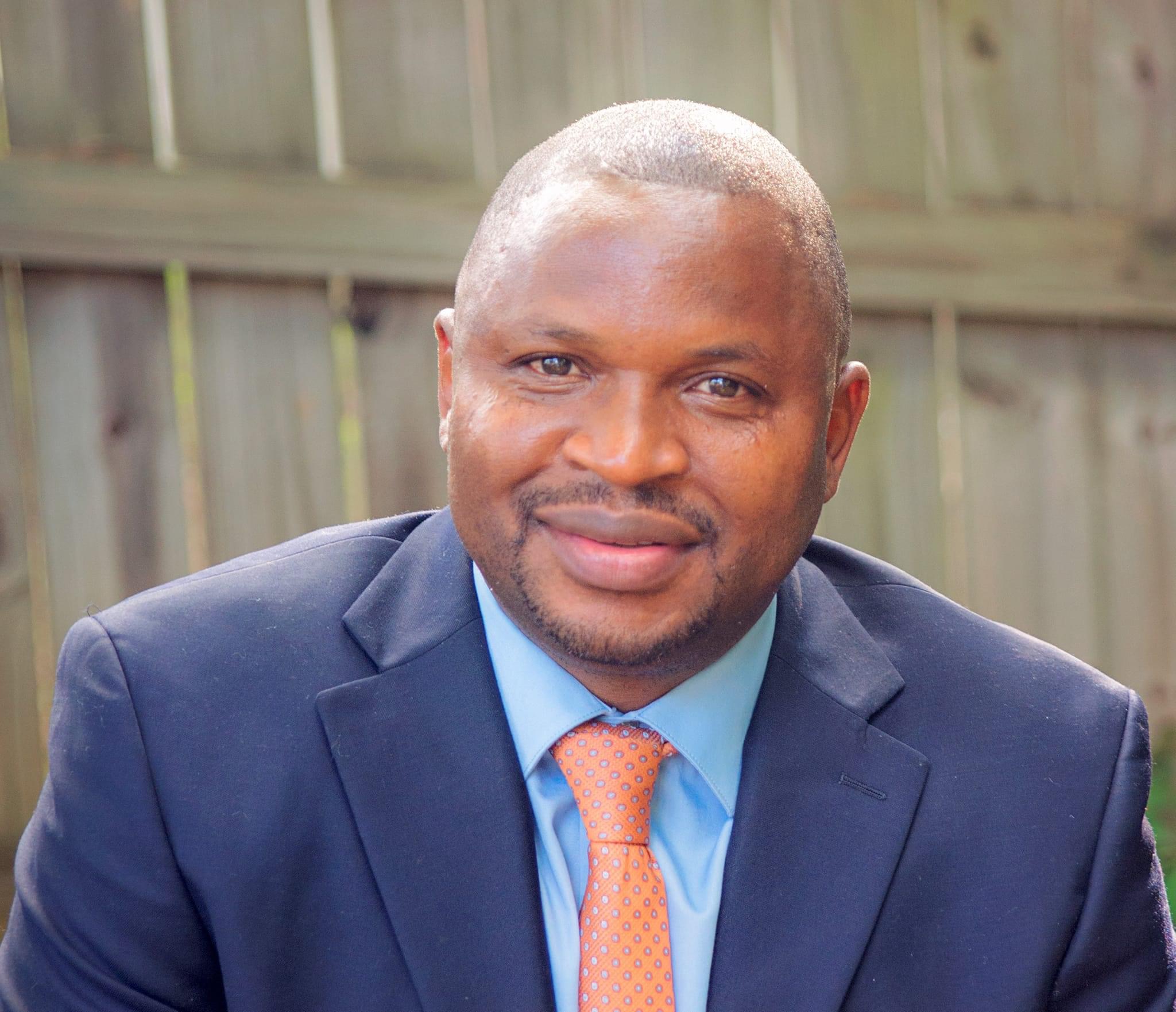
In light of his planned astronomical hike in petrol prices euphemistically called “subsidy removal” in 2023, which his opponents also promised to implement and caused Nigerians embrace as inevitable and desirable, I foretold the imminent social convulsion that is gathering momentum across Nigeria now.
“I can assure Tinubu that if petrol price hikes deepen people’s misery, he’ll have a tough time governing,” I wrote in my April 29, 2023, column. I followed this up with more than half a dozen columns on the same theme.
When you remove subsidies from an all-important product like petrol that literally regulates every facet of life in a country like Nigeria, which also has the dubious honor of being in perpetual competition with India for the status of the world’s poverty capital, and then follow it up with a massive devaluation of the national currency even when the country is hopelessly import-dependent, you unleash existential demons that compel vast swaths of people to choose between life and death.
False assurances that the mass agony in the country is only temporary, or that the pains people are grappling with are mere precursors to future gains, or even that there is light at the end of the tunnel only aggravate people’s angst. There are two reasons for this.
One, most people know that based on past experiences in Nigeria (notably during IBB’s ruinous SAP, which Tinubu merely repurposed and renamed) and elsewhere in the developing world where the IMF and the World Bank dictate economic policies, there has never been a single example of these sorts of pains ever transforming into gains for the masses of the people.
Second, people outside the circles of power and privilege realize that the pains are being borne only by the poor.
Tinubu, for example, bought a new presidential jet worth millions of dollars even before the spineless National Assembly had a chance to rubber-stamp it, as is now their wont, among other profligate expenditures amid a biting economic downturn.
People who are visiting darkness on the poor in the name of a deferred light at the end of the tunnel are glowing in incandescent bulbs of illumination. And the people are intelligent enough to know that what awaits them at the end of this disconsolate tunnel isn’t light. It’s an inferno. It’s a dreary snake pit of doom and gloom.
When people come to this realization, no one needs to “sponsor” them to protest. The pangs of hunger they feel is sufficient to sponsor them to protest. The sensation of hopelessness that overcomes them is a bigger motive force for protest than the political machinations of any politician.
But even if it’s true that opposition politicians are taking advantage of the mass discontent in the country to cripple the government and delegitimize it for their self-interest, that’s not illegal. It’s an intrinsic element of democracies for opposition parties to seize on the missteps of incumbents to displace them.
President Tinubu is in power today precisely because he mastered the art of instrumentalizing the missteps of incumbents to advance his political aspirations. As recently as 2012, he “sponsored” a disruptive protest against former President Goodluck Jonathan that led to the deaths of protesters—for precisely what he is doing to Nigerians now.
No amount of persuasion or financial inducement of traditional rulers, religious clerics, union leaders, or activists will get people to make peace with needless suffering occasioned by a self-centered, hard-hearted implementation of vicious economic policies that snuff the life out of the people. Even if the planned protests are aborted, the predictable is only being postponed.
The only way Tinubu can retain legitimacy and earn the trust of the people is to reverse the deep, stinging hurt his policies have caused to the vast majority of our people. People are no longer interested in progress or the renewal of hope. They just want Tinubu to take them back to where he met them, which was not an enviable state. And that’s not too much to ask.
In a February 10, 2024, column titled “Hunger Protests: Why Tinubu Can’t Govern Like Buhari,” I said the spontaneous, hunger-induced eruption of seething communal anger in Minna, Suleja, Kano, and Osogbo were “a warning sign” that Tinubu couldn’t afford to ignore. He ignored it.
He is probably following the Buhari template of enacting unpopular policies and relying on the blind support of his worshipers to shield him from the consequences of his actions. But Tinubu has no such following, and I am glad he doesn’t, which is why I would hate for someone like Peter Obi or Rabiu Kwankwaso to be president.
They are political cult leaders with unthinking, fanatical followers who lose their damned minds if you as much utter the mildest critical remark about their gods, however factual it may be. Like Buharists, they have abdicated their senses to their political gods.
I reproduce here a portion of the column to remind Tinubu why he can’t benefit from the kind of immunity Buhari enjoyed:
“Had the current president been Muhammadu Buhari and not Bola Ahmed Tinubu, chances are that the worst that would happen amid the adversity people are going through now would be suppressed, barely audible murmurs. It’s because Buhari is a political cult leader with a firm grip on his followers who worship him and surrender responsibility for their lives over to him. Tinubu has no such appeal.
“A psychologist by the name of Steve Taylor came up with a concept he called ‘abdication syndrome,’ which he said disposes people to invest total, child-like trust in a political figure, a cult leader, an opinion molder, etc. in ways that mimic how children idealize and idolize their parents as unblemished paragons of perfection.
“According to Taylor, ‘abdication syndrome stems from the unconscious desire of some people to return to a state of early childhood, when their parents were infallible, omnipotent figures who controlled their lives and protected them from the world. They’re trying to rekindle that childhood state of unconditional devotion and irresponsibility.’
“Buhari is lucky to benefit from abdication syndrome in Muslim northern Nigeria, broadly conceived, which explains why he got away with murder for eight years. When he increased petrol prices by a steep margin in 2016, for instance, there were protests in Kano, Bauchi, and other places in SUPPORT of the increase and AGAINST people who planned to protest the increase. Nigeria had never seen anything like that before.
“Even protests against the unabating descent of northern Nigeria into a theater of bloodshed and abduction on Buhari’s watch provoked counter protests from people who have abdicated the use of their brains in the service of Buhari.
“Tinubu not only does not have the benefit of abdication syndrome anywhere in Nigeria, but he also has the misfortune of having to contend with a peculiar character of Muslim northern Nigeria: we feel the pain of, and react violently to, bad policies only when the policies are hatched and executed by people who have no filiation with our natal region.
“It’s no surprise that the hunger protests against the Tinubu administration started from and spread in the North.
“A powerful indication of Tinubu’s lack of firm emotional support base emerged when Osun, his state of birth where he lost the last presidential election to PDP’s Atiku Abubakar, became the first southern state to join the hunger protests. Should the resistance to his punishingly heartless neoliberal economic policies ignite a nationwide convulsion, the Southwest is unlikely to constitute itself as his bulwark.
“In fact, I hazard a guess that should Tinubu’s unfeeling policies activate the sort of destabilizing national upheaval that we saw in 2012 during Goodluck Jonathan’s administration, the Southwest won’t be aloof. It is likely to join in.
“And, of course, Tinubu is deeply unpopular in the Southeast, the South-south, and Christian northern Nigeria. In other words, Tinubu is essentially floundering into the most treacherous of social quicksands.
“His only fortification against danger is not just good governance but compassionate governance. The release of thousands of metric tons of grains is a good first step, but it’s not nearly enough to stem the tide of mass rebellion that is brewing in the country. At best, it will only delay the inevitable.
“The truth is that Nigeria can’t survive a total withdrawal of petroleum subsidies without an adequate, systematic, well-planned public transportation system. To do away with petrol subsidies, the government must first create conditions where car ownership and patronage of commercial transportation are a luxury.”
You may like
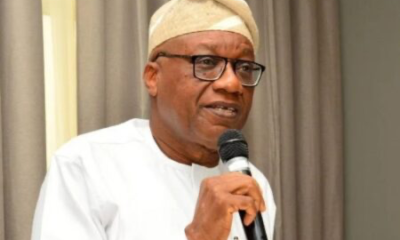

BREAKING: INEC Gets ‘Acting Chairman’ Amid Mahmood Yakubu’s Alleged Sacking


One dead, four injured in Osun Polytechnic cult clash


Lagos launches probe after overhead water tank kills woman


21 months after, NDLEA abandons family of toddler killed by operatives in Delta


Veteran Actor Kanayo O. Kanayo Celebrates Daughter’s 25th Birthday with a Heartfelt Message and a Clear Ultimatum
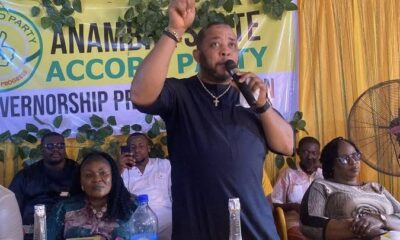

Anambra 2025: Onyeze emerges Accord Party guber candidate
Politics
BREAKING: INEC Gets ‘Acting Chairman’ Amid Mahmood Yakubu’s Alleged Sacking
Published
1 minute agoon
April 10, 2025By
Ekwutos Blog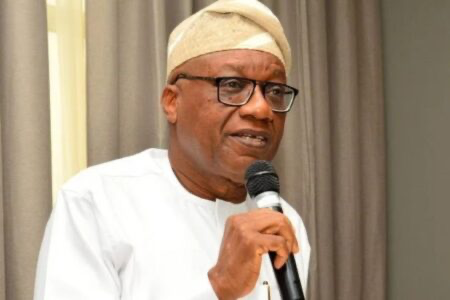
The Independent National Electoral Commission (INEC) has a new acting chairman in the person of Mr Sam Olumekun.
Olumekun, who is INEC’s National Commissioner and Chairman of the Information and Voter Education Committee, was referred to as acting INEC Chairman at a meeting he held with the Labour Party leadership on Wednesday.
Ekwutosblog understands that Professor Yakubu is currently in the Gambia to participate in the ECONEC (ECOWAS Network of Electoral Commissions) meeting.
Per constitutional provision, the tenure of an INEC chairman is five years and they have historically left at the end of their terms if not renewed.
Yakubu assumed the role on November 9, 2015. He became the first INEC chairman to be sworn in for second term after former President Muhammadu Buhari renewed his appointment in 2020.
Section 157 of the constitution stipulates that the president can only remove the INEC chairman with the support of two-thirds of the Senate.
Meanwhile, the new acting chairman, Olumekun, met with a delegation of the Labour Party, led by Abia State Governor Dr Alex Otti, who visited INEC headquarters in Abuja.
Days ago, reports claimed that President Bola Tinubu had sacked Yakubu as INEC chairman and replaced him with Professor Bashiru Olamilekan.
However, the presidency debunked the reports. The Senior Special Adviser to the President on Digital and New Media, O’tega Ogra, urged the public to disregard the reports as “fake news”.
Ogra noted that such an announcement would come through official channels such as the Office of the Secretary to the Government of the Federation.
Amid reports of his sacking, Professor Yakubu presided over INEC’s weekly meeting at the Commission’s headquarters in Abuja on Tuesday.
The meeting included several national commissioners, including Olumekun.
“Crucial decisions would be taken at the meeting,” INEC had said in a tweet.
Politics
Anambra 2025: Onyeze emerges Accord Party guber candidate
Published
1 hour agoon
April 10, 2025By
Ekwutos Blog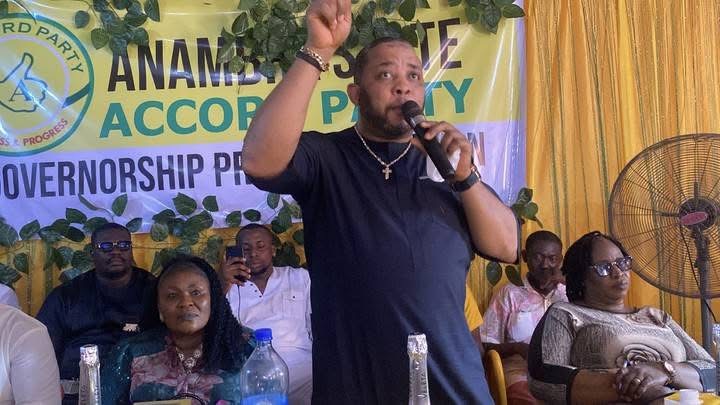
Anambra philanthropist, Chief Chidi Charles Onyeze, has emerged the governorship candidate of the Accord party for the November 5 2025 Anambra governorship election.
He was declared unopposed during the Party’s Primary election process held at East End Hotel, Aroma, Awka, on Tuesday, April 8, 2025.
The exercise was witnessed by thousands of party chieftains, members, INEC, security, and the media.
By his emergence, Chief Onyeze has become the youngest governorship candidate, who will participate in the election alongside the incumbent governor of the state, Prof Chukwuma Charles Soludo (APGA), Prince Nicholas Ukachukwu (APC), Mr. Jude Ejimofor (PDP), Chief George Muoghalu (LP) and other awaiting candidates from other political parties.

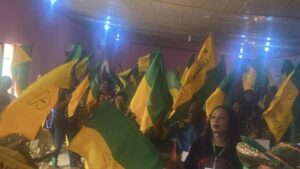
Speaking to Journalists shortly after the process, Onyeze said he is contesting the election to address the current challenges of unemployment, insecurity, and poor educational system in Anambra State.
Politics
FG UNVEILS GOVERNANCE SCORECARD TO ACCELERATE $1 TRILLION ECONOMY VISION
Published
2 hours agoon
April 10, 2025By
Ekwutos Blog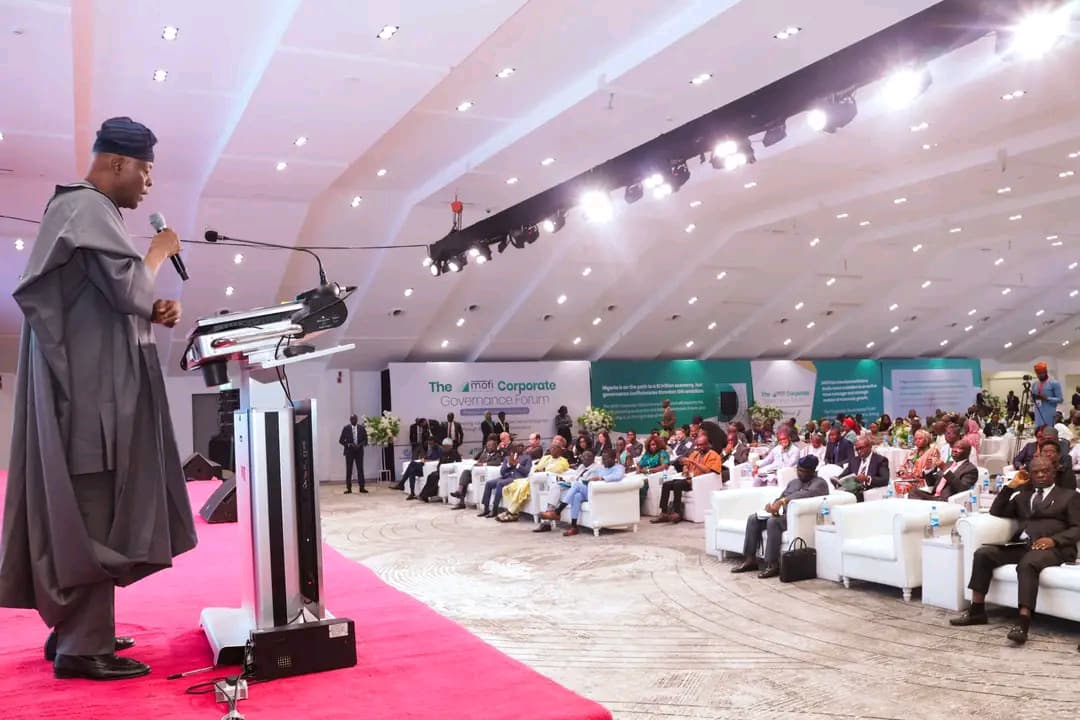
The Honourable Minister of Finance and Coordinating Minister of the Economy Mr Wale Edun has spotlighted corporate governance as a key lever in President Bola Ahmed Tinubu’s push to build a $1 trillion economy, urging state-owned enterprises (SOEs) to meet global standards of transparency, ethics, and performance.
Speaking at the MOFI Corporate Governance Forum in Abuja on Monday, the Honourable Minister described the newly introduced MOFI Scorecard as a vital benchmark for institutional health—designed to position SOEs for investment, growth, and long-term value creation.
This scorecard is not just a document—it’s a test, Edun said. He added that Strong governance attracts capital, builds trust, and delivers real economic returns.
The two-day forum, themed Ensuring Value Creation in State-Owned Enterprises Through Better Corporate Governance, brought together CEOs, regulators, and development partners to examine how better oversight can unlock Nigeria’s public asset potential.
Referencing entities like NNPC Ltd, Edun noted that SOEs must be investor-ready as the government shifts from debt-heavy budgets to equity-based growth. He also pointed to positive macro signals and falling food and fuel prices—as early signs of a stabilising economy.
MOFI Chairman Dr. Shamsudeen Usman confirmed that the scorecard will be enforced through independent assessments, including MOFI itself. We are not asking others to do what we haven’t already done, he said.
MOFI CEO Dr. Armstrong Takang outlined a rollout that includes third-party evaluations, remediation plans, and public recognition through the annual MOFI Excellence Awards.
Backed by the World Bank, the initiative marks a shift in how Nigeria manages public wealth—with governance now central to growth, resilience, and investor confidence.
The introduction of the governance scorecard is a testament to the Federal Government’s commitment to transforming Nigeria’s economy. As the country moves forward, one thing is clear: transparency, accountability, and growth will be the guiding principles for the SOEs.

BREAKING: INEC Gets ‘Acting Chairman’ Amid Mahmood Yakubu’s Alleged Sacking

One dead, four injured in Osun Polytechnic cult clash

Lagos launches probe after overhead water tank kills woman
Trending

 Trending6 months ago
Trending6 months agoNYA demands release of ‘abducted’ Imo chairman, preaches good governance
- Business6 months ago
US court acquits Air Peace boss, slams Mayfield $4000 fine

 Politics6 months ago
Politics6 months agoMexico’s new president causes concern just weeks before the US elections
- Entertainment6 months ago
Bobrisky transferred from Immigration to FCID, spends night behind bars
- Entertainment6 months ago
Bobrisky falls ill in police custody, rushed to hospital

 Politics6 months ago
Politics6 months agoRussia bans imports of agro-products from Kazakhstan after refusal to join BRICS

 Politics6 months ago
Politics6 months agoPutin invites 20 world leaders
- Politics1 year ago
Nigerian Senate passes Bill seeking the establishment of the South East Development Commission.

